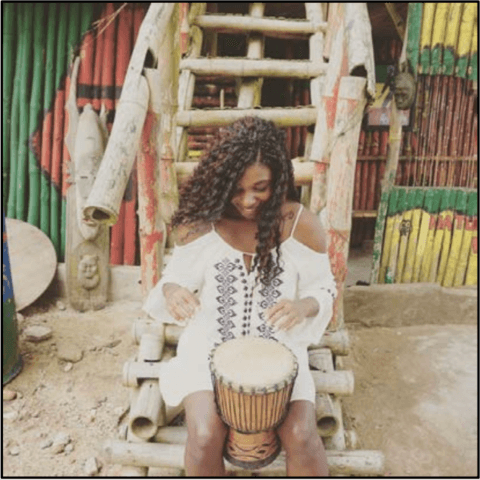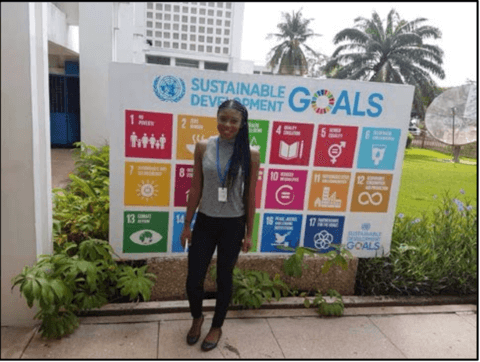How I found My Passion for Gender Equality: Womanism in Ghana, The Eighth Wonder of the World

As I stepped off the plane and onto the tarmac, I felt a culmination of excitement and nerves. This was my first time in the country of Ghana and in the continent of Africa for that matter. I made the decision to take an Internship with the Ministry of Justice of Ghana’s Legal Aid Scheme, it was a huge leap. Travelling to Ghana without the chaperonage of my school or any program meant that I was to be on my own until I made a substantial number of friends who could show me the ropes of the culture and infrastructure. My first day at the office was less of an orientation and more of a huge step into the shoes of what it meant to be an African woman. These were indeed big shoes to fill. I was immediately faced with so many of the issues I read about in my textbooks, gender oppression and recurring domestic violence due to financial dependence. As these women cried to our office for help, I too felt a bit of their pain. Shortly after, I began making friends with recent graduates of the University of Ghana Legon who too, were working at the Scheme for their National Service. In many friendly conversations with groups of both male and female friends the topic of a woman’s place arose. It was with conviction that often every man in the room believed that a woman’s place was in the kitchen. It was believed that it was both a sociologically customary and acceptable for women to cook, clean, tend to the children and have minimal opinions on the finances of the home in some cases even when she is contributing to those finances.
Any woman who questioned this opinion was seen as too progressive, opposed to tradition and unfit for marriage. I began to look forward to these lunch time discussions, both intrigued by the difference in mentality and eager to hopefully broaden their perspective on the role of women. I had little luck in the early stages however, as the weeks turned into months they slowly began to come around to a more level playing field with regards to gender roles. I often saw women come to the office crying hysterically after being beaten, yet unable to leave, as their husbands were the sole breadwinners in their family and they had no other means of monetary support. I simply asked a close friend of mine, “When did it become okay to be blatantly seen as lesser of a person because of your gender.” The answer was it was seen as tradition. I pondered on where tradition ends and oppression begins and the blurry line which seemed to divide the two. The market place was the epitome of hustle, bustle, and bargains. Beautiful fabrics, colorful trinkets and spicy foods surrounded me; the market soon became my go-to spot for lunch whether it be to purchase banku and okro stew, or to search for canvass oil paintings which would later decorate the walls of my room. It was not however, simply a market in my eyes; this was a collective of strong women. This was the embodiment of entrepreneurship; a fellow intern from Brazil noted that the beauty of Ghana is that everyone may not be employed but everyone works. An interesting phenomenon which I stumbled upon was the baffling concept of being fit for marriage. Many a man described this as being industrious around the house inclusive of pounding fufu for hours until smooth, being humble and modest all while maintaining impeccable beauty.
I contemplated upon what seemed as their prerequisites for marriage and jested “suppose I am proud because I am an educated woman, Suppose I am grandiose because I am a fan of great fashion. God forbid I choose to serve left overs because I have been at work all day and now must tend to the family?”. This was blasphemy to their ears and inconceivable, it was concluded that it must be humor alone indeed. It was at this moment that I knew what my research must be based on. I immediately began interviewing women from different regions and tribes, often taking a close friend along to help with the translation for words beyond the ever so prevalent “Eti Sen” (how are you) commonly used as a greeting. It was through these interviews that my eyes were opened to a new perspective. These women gave me a vantage point to the issue of sexism in Africa. I am now determined to tell of their stories and advocate for change. The country of Ghana is a wonder of the world, a marvel indeed and one which must be experienced for one’s self. I explored the lush fauna of the Kakum National Park, traveled to the great Lake of Volta, embarked upon an Aqua Safari in the Central Region, stepped upon stones which my ancestors slept on in Cape Coast’s Slave Caste, navigated the hectic streets of Tema, Teshie and Nungua as well as shared the chronicles of my Troski rides from Grader Estate to greater Accra with my coworkers upon arrival daily. Most importantly I uncovered a world within a world, a world where Womanism is a minority mentality and one which is shunned. The continent of Africa is also victim of negative outdated stigmas, many of them which are untrue. This served as a microcosm to the gender situation in Ghana and its own struggle with oppression.
It would be an incredulous oversight for me not to mention the strides that Ghana has made with regards to women in leadership. As of recent there has been an incline in the number of women selected to serve as African Judiciaries. The position of these women are more than just personal victories as they have had symbolic effects in changing social norms. I had the pleasure of working on a high -profile case judged by a woman; I could not help but feel empowered, motivated and a strong sense of pride. These women are beacons of light in the fight for gender equality. There are currently three women serving in the Supreme Court of Ghana, that is 30% of the bench. While the battle for women’s empowerment in Africa has made significant progress but it far from finished. I found a voice as an empowered woman halfway across the world, Ghana is truly a phenomenon. Africa is a Mother for a land indeed.


